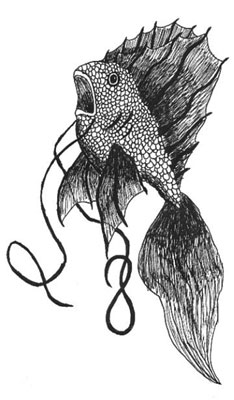All Nonfiction
- Bullying
- Books
- Academic
- Author Interviews
- Celebrity interviews
- College Articles
- College Essays
- Educator of the Year
- Heroes
- Interviews
- Memoir
- Personal Experience
- Sports
- Travel & Culture
All Opinions
- Bullying
- Current Events / Politics
- Discrimination
- Drugs / Alcohol / Smoking
- Entertainment / Celebrities
- Environment
- Love / Relationships
- Movies / Music / TV
- Pop Culture / Trends
- School / College
- Social Issues / Civics
- Spirituality / Religion
- Sports / Hobbies
All Hot Topics
- Bullying
- Community Service
- Environment
- Health
- Letters to the Editor
- Pride & Prejudice
- What Matters
- Back
Summer Guide
- Program Links
- Program Reviews
- Back
College Guide
- College Links
- College Reviews
- College Essays
- College Articles
- Back
Draw in the Fishing Line MAG
“Jacques Cartier was amazed by the large number of fish his ships caught in the Grand Banks when he arrived in what is now Canada in 1534. He called the Grand Banks terra dos baccalaos, which in Portuguese means land of the cod,” writes Graham Beehag in his book, Fishing. But that was then, and this is now. Studies show that fish species, including cod, salmon, anchovy, herring, and several others, have decreased drastically in recent years. Overfishing is an issue that people need to be aware of. Little by little, we obliterate our environment without even knowing it.
The fishing industry is vital in Canada, where I live, especially in the Atlantic Provinces. However, overfishing is causing a large decline in the industry. Many of these problems began in the past 50 years with advances in fishing technology. Once hundreds of trawlers and fishing boats were used, but now huge factory ships, which can stay at sea for weeks at a time, have replaced them. These have the equipment either to freeze or tin fish on board, and don’t need to return to base until their holds are full.
With these new factory boats, there has been a seven percent growth in catches every year since the 1950s, but since then the size of catches has increased little. At least 20 of the world’s most important fisheries have disappeared in the past 25 years, with others suffering so badly from overfishing that they are unlikely to recover.
As fish stocks have decreased, so has the size of mesh used in nets, enabling smaller and smaller fish to be caught. Many are too small to be used as food, so they are crushed and made into animal food or fertilizer.
Nets are indiscriminate; any fish that’s too big to get through the mesh and gets in the way of the net will be caught. For every ton of prawns caught, three tons of other fish are destroyed and thrown away.
The overfishing of one species not only damages the entire population but also affects other fish farther up the food chain. For example, herring is a vital prey species for cod. Therefore, when herring are overfished, the cod population suffers as well.
Urgent action is needed to change fishing practices. In the Pacific, coastal communities are losing their most precious resources to overfishing. The dramatic decline in the amount of cod in the oceans surrounding Canada has come to the attention of the government. A moratorium was imposed on the fishing of cod more than 10 years ago. Its purpose was to give the fish stocks time to regenerate and become sustainable. It will take a few years for the population of cod to recover enough to allow sustainable fishing to resume. The numbers are increasing, but not as fast as was hoped.
Aquaculture, the farming of fish and seafood, offers new prosperity for its residents. Although it is a relatively new industry, it has grown at a steady pace of 20 percent each year since 1986. It is found in every province and territory of Canada, including 16 aboriginal communities. The key products of fish farms are salmon, trout, Arctic char, blue mussels, and oysters. Aquaculture helps produce fish without emptying oceans.
This, however, is not enough. We need to do more to ensure the safety of the fish populations. Properly maintained fisheries could and should be a renewable and possibly even endless supply of food. At the present, short-term economic pressures are preventing sensible long-term plans to harvest only as many fish as can be replaced by reproduction the following year.
Quotas should be set on catches, based on scientific estimates for the size of the fish stock. Nets with the correct mesh size should be used to ensure fewer accidental catches. International agreements limiting catches are necessary to safeguard fish stocks. With these measures in place, fishing could continue without damaging stocks, and we could employ the world’s richest source of protein to everyone’s advantage.
We must do what we can to secure marine ecosystems. It will take a lot of work and time, but with the passing of stricter laws to protect cod and other endangered fish, we have a chance for a more sustainable future. We must convince the world of the severity of this issue. We have to do whatever we can to protect the fish. Someone once said, “Every accomplishment starts with the decision to try.” That is what we should be doing.

Similar Articles
JOIN THE DISCUSSION
This article has 3 comments.

0 articles 0 photos 12292 comments